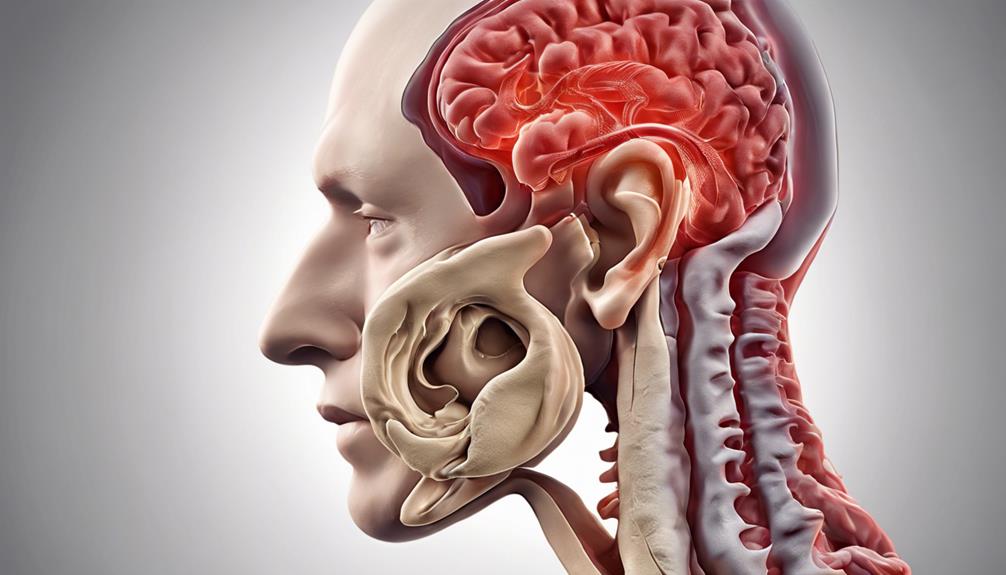In the complex network of our sensory systems, the relationship between sensorineural hearing loss and headaches may not be obvious at first. However, as we delve into the underlying mechanisms, a better understanding emerges, illuminating how these seemingly unrelated issues can be connected.
By unraveling this complex relationship, we uncover valuable insights that could potentially reshape our approach to managing both conditions. Discovering the impact of sensorineural hearing loss on headaches may just be the key to unlocking a path towards improved well-being and quality of life.
Key Takeaways
- Sensorineural hearing loss affects vestibular system, potentially triggering headaches.
- Communication challenges and sensory sensitivities from hearing loss can worsen headaches.
- Addressing hearing loss can alleviate headache frequency and related neural pathways.
- Managing hearing changes can reduce headache development and associated physical strain.
Understanding Sensorineural Hearing Loss
Sensorineural hearing loss occurs due to damage in the inner ear or auditory nerve, disrupting the transmission of sound signals to the brain. This type of hearing loss is often linked to various factors such as aging, exposure to loud noises, genetic predispositions, and certain medical conditions. It's typically permanent, leading to difficulties in hearing faint sounds and understanding speech clearly.
Diagnosis of sensorineural hearing loss involves audiometric testing to evaluate the degree and nature of hearing loss across different frequencies. Treatment options for this condition include using hearing aids, cochlear implants, auditory training, and assistive listening devices to help individuals manage their hearing loss effectively.
Understanding the causes and available treatments for sensorineural hearing loss is crucial in addressing this condition and maintaining a good quality of life despite the challenges it presents.
Connection Between Hearing Loss and Headaches

Understanding the intricate relationship between hearing loss and headaches sheds light on the significant impact of vestibular system involvement in both conditions.
Sensorineural hearing loss can contribute to headaches through the shared involvement of the vestibular system. Changes in inner ear function associated with sensorineural hearing loss may trigger vestibular migraines, which further exacerbate headache occurrence. Vestibular migraines, characterized by symptoms like tinnitus and hearing loss, highlight the strong connection between hearing issues and headaches.
Inner ear disturbances resulting from sensorineural hearing loss can disrupt vestibular function, potentially leading to the onset of headaches in affected individuals. Recognizing the interplay between inner ear dysfunction, vestibular disturbances, and headache occurrence is crucial in managing headaches related to sensorineural hearing loss.
Impact of Hearing Changes on Head Pain
Hearing changes can significantly impact the experience of head pain, affecting individuals in various ways beyond just auditory perception. When considering the impact of hearing changes on head pain, several key factors come into play:
- Communication Difficulties: Struggling to hear or understand speech can lead to increased stress and frustration, potentially triggering headaches.
- Sensory Sensitivities: Changes in hearing sensitivity can exacerbate migraines, especially in individuals with sensory sensitivities.
- Muscle Tension: Straining to compensate for hearing loss may result in muscle tension, contributing to headache symptoms.
- Social Isolation: Hearing loss-related social isolation can foster feelings of loneliness and anxiety, which may manifest as headaches.
- Mental Fatigue: The cognitive effort required to overcome hearing challenges can lead to mental fatigue, potentially exacerbating headache discomfort.
Understanding how hearing changes intertwine with head pain is crucial in managing symptoms effectively and seeking appropriate treatment.
Managing Symptoms and Seeking Treatment

To effectively manage symptoms and seek treatment for headaches associated with hearing changes, individuals should prioritize addressing both their auditory and pain-related concerns concurrently. Sensorineural hearing loss can contribute to headaches through overlapping neural pathways, stress, frustration, and cognitive load in noisy environments.
Managing symptoms involves seeking treatment for hearing loss to alleviate headache frequency and intensity. When experiencing tension headaches due to hearing difficulties, it's essential to address the physical strain from attempting to hear or focus on sounds. Treatment for sensorineural hearing loss can help mitigate the development of headaches associated with the condition.
Strategies for Coping With Headaches
Implementing relaxation techniques such as deep breathing and meditation can significantly alleviate symptoms of headaches. When dealing with headaches, especially in patients with sensorineural hearing loss, it's crucial to explore various strategies for managing the pain.
Here are some effective ways to cope with headaches:
- Consistent Hydration and Balanced Diet: Ensuring you stay hydrated and maintain a balanced diet can play a significant role in preventing headaches.
- Regular Physical Activity: Engaging in activities like walking or yoga can help reduce both the frequency and intensity of headaches.
- Good Sleep Hygiene: Practicing good sleep habits, such as maintaining a consistent sleep schedule and creating a comfortable sleep environment, is essential for headache management.
- Professional Guidance: Seeking advice from healthcare providers for personalized headache management strategies can lead to more effective treatment plans.
- Stress Management: Incorporating stress-reducing techniques like mindfulness or relaxation exercises can also aid in coping with headaches.
Frequently Asked Questions
Can Sensorineural Hearing Loss Cause Headaches?
Yes, sensorineural hearing loss can cause headaches. The interconnected nature of the auditory and vestibular systems can lead to changes in inner ear function, potentially triggering vestibular migraine symptoms like headaches.
Research suggests a correlation between sensorineural hearing loss and migraines, highlighting a complex relationship.
Understanding this impact on vestibular function may provide insights into how sensorineural hearing loss contributes to headaches in affected individuals.
Can Ear Damage Cause Headaches?
Yes, ear damage can indeed cause headaches.
When the delicate structures of the ear are compromised, such as inflammation or damage to the cochlea or auditory nerves, it can lead to disruptions in the auditory and vestibular systems.
These disruptions can trigger vestibular symptoms that contribute to headaches.
The interconnected nature of the inner ear's function with the brain's response to auditory signals can manifest as headaches, indicating a relationship between ear damage and headache occurrence.
How Does Sensorineural Hearing Loss Affect Everyday Life?
Sensorineural hearing loss impacts everyday life by affecting communication, social interactions, and emotional well-being. Struggling to hear conversations and environmental sounds can lead to frustration, isolation, and mental fatigue.
Seeking timely intervention, like hearing aids, can greatly improve daily functioning and quality of life. It's essential to address hearing loss promptly to prevent negative impacts on work performance, relationships, and overall well-being.
Can Blocked Ears Cause Migraines?
Yes, blocked ears can lead to migraines. Increased pressure in the inner ear from blockages can disrupt blood flow, triggering headache symptoms.
Eustachian tube dysfunction, contributing to ear blockage, may disturb ear pressure regulation, exacerbating migraines.
Inner ear conditions like Meniere's disease, associated with hearing loss and vertigo, can also result in migraines.
Addressing ear blockages promptly is crucial for managing headaches linked to inner ear issues.
What Are the Effects of Sensorineural Hearing Loss on the Brain?
Sensorineural hearing loss can have significant effects on the brain. Studies have shown that this type of hearing loss can lead to changes in brain function, including reduced cognitive abilities and increased risk of dementia. Understanding the brain experiment hearing loss root cause is crucial for developing effective treatment strategies.
Conclusion
In conclusion, the correlation between sensorineural hearing loss and headaches, particularly in conditions like vestibular migraine, highlights the importance of early detection and comprehensive auditory assessments.
By understanding the intricate relationship between the auditory and vestibular systems, individuals experiencing symptoms like tinnitus and hearing loss can seek timely interventions for improved outcomes.
Managing symptoms and seeking treatment for hearing changes can not only alleviate head pain but also enhance overall quality of life.










